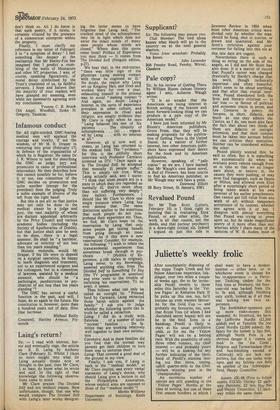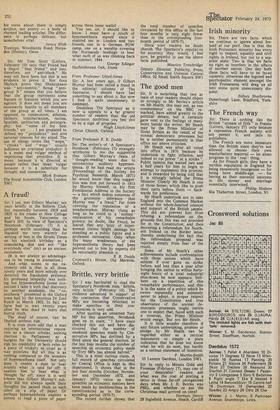Revalued Pound
Sir: Mr Tom Scott (Letters, February 10) is I think right in insisting that in evaluating Ezra Pound, or any other artist, the work is all that counts, not the deeds, and that parlour psychiatry is a down-right critical sin. Indeed I argued on just this side in
Sewanee Review in 1950 when most other American critics were divided only by whether the man should be hung, shot ot sunrise, or drawn and quartered, and Mr Scott's strictures against your reviewer for falling into this sin at this late date are -cogent.
Nevertheless there is such a thing as erring on the side of the angels, as I did and Mr Scott has also done. It is a matter of record that Pound's career was changed drastically by Hardy's charge that his work, though technically important and often beautiful, didn't seem to be about anything; and that after that crucial interview, Pound abandoned both the lyric and literary criticism — to our loss — in favour of political and economic tracts in prose, and Los Cantares in poetry. He became, in short, didactic, and much as one may admire the Cantos, as I do, one must also face the fact that about two thirds of them are didactic or outright polemical, and that their content must be taken into account before we can criticise their execution. Neither can be considered without the other.
Pound plainly wanted this; he said so often. But it is something we automatically do when we evaluate poets remote enough from us in time so that we no longer care about, or believe in, the causes they were pushing, or may even find repugnant, such as Dante or Milton, and allowed even Eliot after a surprisingly short period of being taken aback at his own reversal of his earlier preachments. One cannot get full value from any work of art without temporary acceptance of its content, whether one agrees with it or not. I disagree with almost everything that Pound was trying to press upon us, but he made magnificent poetry of it more often than not; whereas while I share many of the opinions of W. H. Auden, most of his verse about these is simply artifice, not poetry — a body of rhymed leading articles. The difference is perhaps delicate, but nonetheless vital.
James Blish Treetops, Woodlands Road, Harpsden (Henley), Oxon
Sir, Mr Tom Scott (Letters, February 10) says that Pound had a Negro " best friend" and was, therefore, not "anti-black." He may not have been but this is not evidence to prove it. Nor does Shylock prove that Shakespeare was " anti-semitic." Being "antigroup X" means that you believe that the group represents some feature or features which you are against. It does not mean you are necessarily hostile to all members of the group at all times. I am opposed to communism, atheism, idolatry, totalitarianism, racism, fatalism, unilitarism and pornography: but "some of my best friends," etc . . . I am prepared to defend my " prejudices" and give national reasons for my stand. The use of slangy terms like " wops," "
chinks" and " wogs " usually indicates an irrational prejudice: it is a mean and vulgar method of expressing that prejudice. It is mean because it is directed at people rather than ideas; vulgar because it is a substitute for thought and insensitive.
The Royal Automobile Club, London SW1



































 Previous page
Previous page